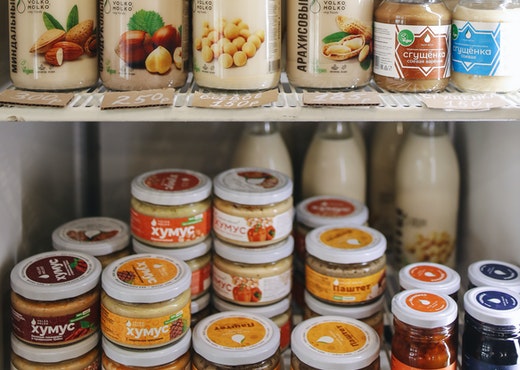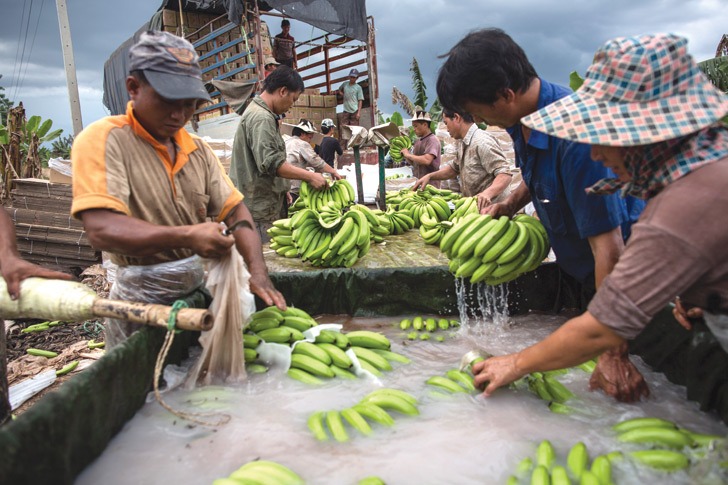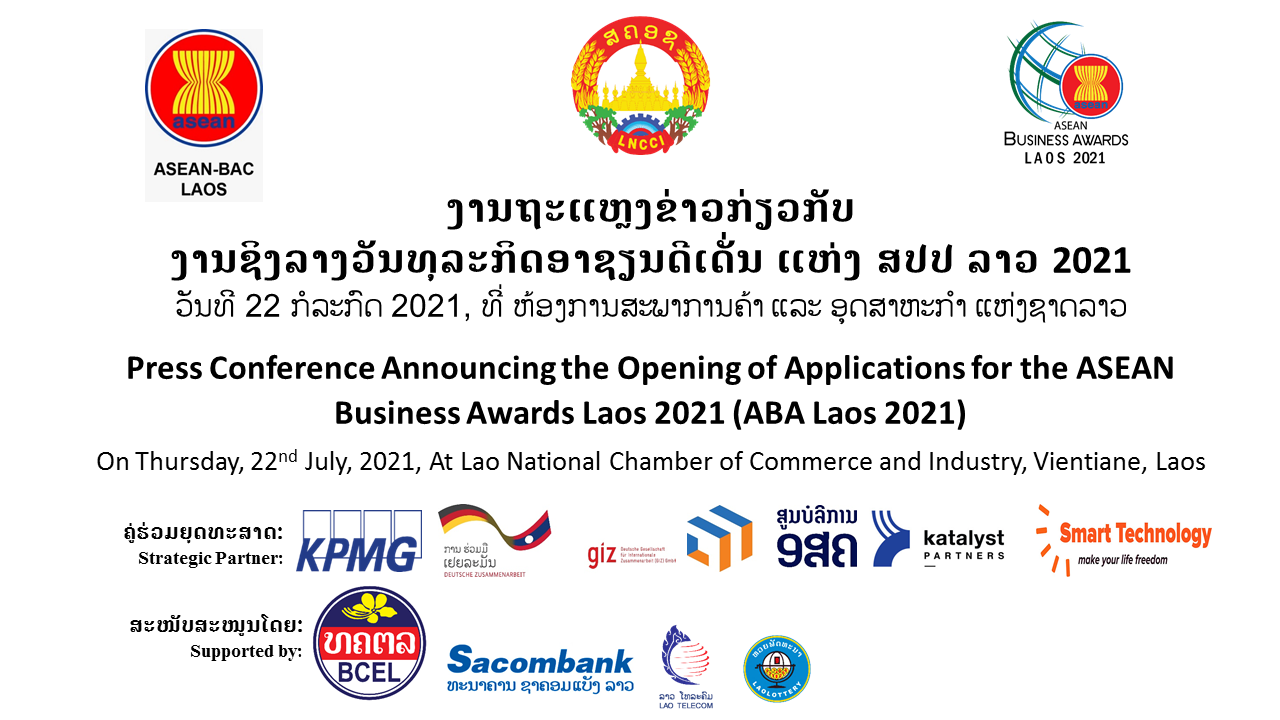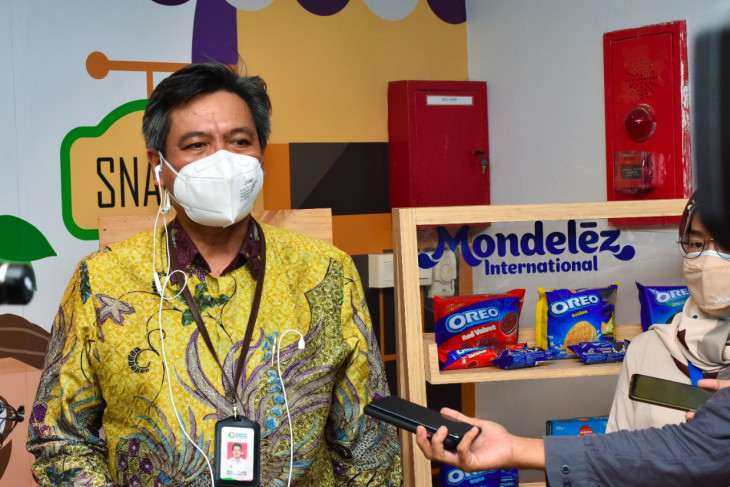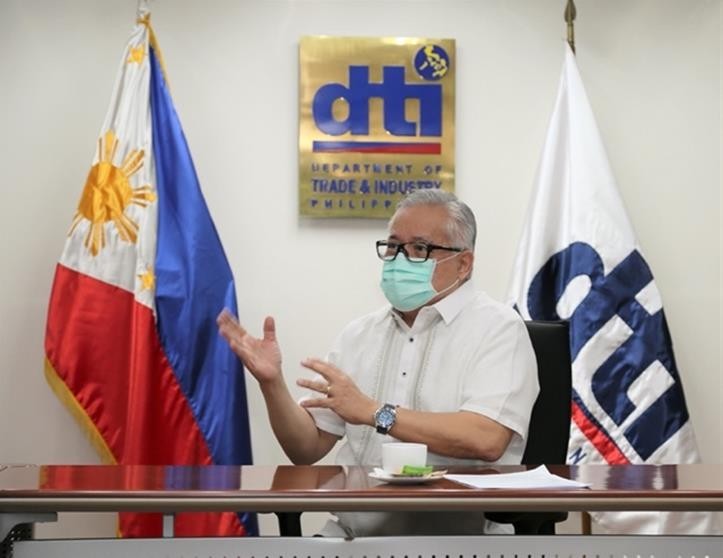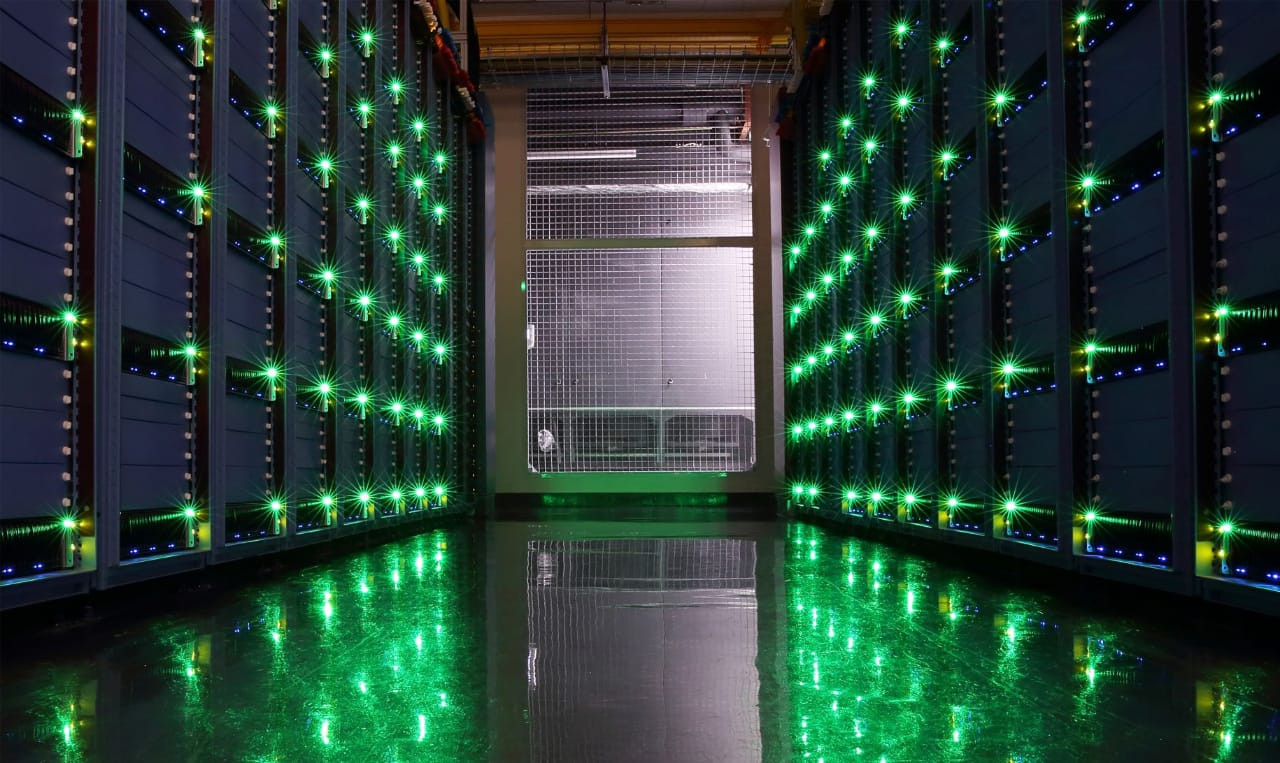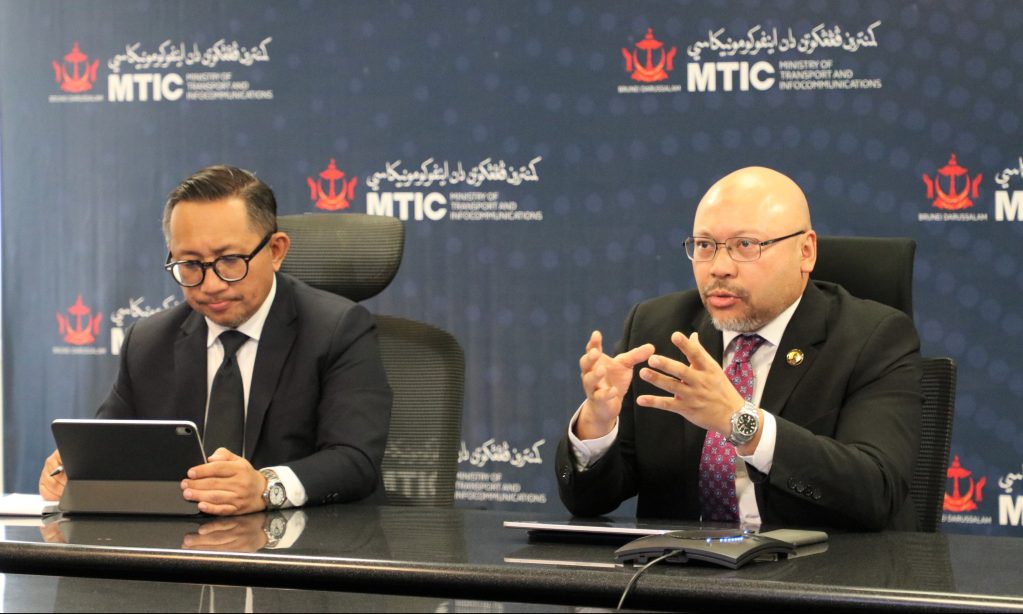In January, the value of banana exports stood at US$22.8, rising to US$23 million in February and US$34 million in March before dropping to US$22 million in April, US$17 million in May, and US$15 in June.
Exports slumped due to trade restrictions because of the pandemic, according to the Ministry of Industry and Commerce
Laos sold most of the crop to China and Thailand, with the value increasing to about US$227.4 million in 2020.
The amount of bananas grown for export has steadily increased, as more plantations created under contract farming become ready for harvesting.
However, the number of investors and banana plantations has declined after the government stopped granting concessions for new plantations and ended agreements with companies that had violated regulations.
The government says banana plantations should be operated in line with good agricultural practices and its policy on clean, green and sustainable agricultural development.
Export growth has been driven by increased production under Laos’ contract farming system.
The shift in China’s banana sourcing towards South-East Asian countries has also played a role in boosting banana exports from Laos.
Given the success of the banana industry in China, the Lao government is working with other fresh produce growers to increase quality in the hope of gaining access to more markets.
The Ministry of Agriculture and Forestry has drawn up a list of crops it will prioritise in negotiating access to Chinese markets. The list includes sweet potatoes, jackfruit, longans, oranges, grapefruit, dragon fruit, chillies, passion fruit, green beans, peanuts, eggplant, cabbage and pumpkins.
Other major commercial crops are rubber, cassava, raw coffee, sugar and fruit (watermelon, passion fruit and tamarind) with the total export value of agricultural produce in 2020 reaching almost US$1 billion.
In the afternoon on Thursday, July 22nd, 2021, the Lao National Chamber of Commerce and Industry (LNCCI) in collaboration with VELA project, GIZ in Lao PDR launched the press conference announcing the opening of applications for the ASEAN Business Awards Laos 2021 (ABA Laos 2021) supported by BCEL, Sacombank Laos, Lao Telecom and Lao lottery under the chairmanship by Mr. Thanongsinh KANLAGNA, Vice President of Lao National Chamber of Commerce and Industry (LNCCI), co-chair by Mr. Savankhone RAMOUNTRY, President of Lao Journalist and Senior Representative from VELA project, GIZ in Lao PDR Mr. Santi INTHAVONG, which was attended by Strategic Partner: KPMG Laos Co., Ltd, VELA, GIZ in Lao PDR, Smart Technology Co., Ltd, Katalyst Partner
The ASEAN Business Awards (ABA) Laos 2021 aims to recognize the outstanding Lao businesses and use them as champions to spread the knowledge of doing business in the ASEAN Economic Community. It aims to inspire and rally Lao businesses to participate in the integration process and become key players in the ASEAN market. In the bandwagon of growth and prosperity of the ASEAN Economic Community the ABA Laos 2021 encourages strengthening competitiveness of Lao private sector in the AEC.
The Winners will qualify to represent Laos to apply for ASEAN Business Awards 2021 (ABA 2021). The announcement of the Winner ASEAN Business Awards 2021 (ABA 2020) will be held during organizing the ASEAN Business and Investment (ASEAN-BIS) and the 36th ASEAN Summit in Brunei.
The ABA LAO 2021 awards will have the following categories:
1. Lao Priority Integration Sectors Excellence Awards (The winner has 1 award under the 12 Business sectors): Agriculture / Agri-based, Energy, Fisheries, Food & Beverages, Handicraft, ICT, Infrastructure, Textiles, Tourism, Transport & Logistics, Wholesale / Retail, Wood-based
2. SME Excellence Awards (The winner has 1 award under the 5 awards sector): ∙ Growth, Employment, Innovation, Corporate Social, Responsibility (CSR), Digital Transformation
3. Special Awards (The winner have 1 award under the 8 awards sector): Friends of Laos, Young Entrepreneur, Women Entrepreneur, Family Business, Green Enterprise, Sustainable Social Enterprise, Start-up and IDE, Skill Development (New)
How to apply?
FILL OUT
Download the nomination form of your desired award category, fill out the fields, and include the necessary attachments https://lncci.la/aba2021/en/index.php
SUBMIT
Submit your nomination until September 30th, 2021 either electronically or in physical print to the following address:
Lao National Chamber of Commerce and Industry/ ABA Laos Secretariat
Tel: 856 20 5256 2729, +856 20 5953 5392 or +856 20 9444 3513.
Fax: 856 021 452 580
Email: abalaos@lncci.la
ANNOUNCEMENT
Winners and runners-up will be announced on October 27th, 2021.
Credit Facebook: ASEAN Business Awards Laos 2021
The utilization of the food and beverage industries in Indonesia has reached 89 percent amid the pandemic, acting Director General of Agro-based Industry at the Ministry of Industry Putu Juli Ardika has informed.
Production at food and beverage factories is still on track, and demand is increasing both in the domestic as well as the foreign market, he noted.
This has helped boost Indonesia's foreign exchange reserves and proved that the nation's industry has the potential to compete in the global market, he said.
According to the Ministry of Industry, the food and beverage industry was one of the most significant sectors that helped national manufacturing exports to skyrocket in the first six months of 2021.
The total export value of the non-oil and gas processing industry from January to June, 2021 reached US$19.58 billion, an increase of 21.68 percent compared to the year-ago period.
The food and beverage industry attracted investment of Rp36.6 trillion -- Rp14.7 trillion in domestic investment (PMDN) and Rp21.9 trillion in foreign investment (PMA) -- in the first half of 2021 amid the pandemic, as per ministry data.
To support the performance of the food and beverage industry and help factories continue production, the Industry Ministry is determined to maintain the availability of raw materials, Ardika said.
The food and beverage industry is also a labor-intensive sector and is responsible for increasing the added value of domestic raw materials, he added.
Source: Antara News
Reporter: Risbiani F, Resinta S
Editor: Rahmad Nasution
Original published date: 31 July, 2021
Hyundai Motor Group said on Thursday it will partner with LG Energy Solution to build an electric vehicle battery factory in Indonesia to secure a stable supply of battery cells for its EVs.
The two South Korean companies signed a memorandum of understanding with the Indonesian government to establish a joint venture to manufacture battery cells.
Under the agreement, Hyundai and LG Energy will invest a total of $1.1 billion to build a battery cell plant in Karawang, just east of Jakarta, with both companies holding 50% ownership. The Indonesian government has agreed to offer incentives and rewards to support the plant.
Hyundai said construction of the Indonesian plant is scheduled to start in the fourth quarter and will be completed by the first half of 2023. Mass production of battery cells at the new facility is expected to commence in the first half of 2024.
The proposed Karawang plant is described by the companies as the "most optimal location" for each. Indonesia is one of the world's largest producers of nickel, a key raw material for EV batteries.
The Indonesian government has been aggressively fostering an EV industry ecosystem in hopes of playing a pivotal role in the global EV race -- including through the establishment of Indonesia Battery Corp. earlier this year.
The new battery cell factory in Karawang, close to the Indonesian capital of Jakarta, will be constructed on a 330,000-sq.-meter plot of land. When fully operational, it is expected to produce 10 GWh worth of lithium-ion battery cells annually, or enough for more than 150,000 EV batteries.
Source: Nikkei Asia
Author: Kim Jaewon
Original published date: 29 July, 2021
Six main types of e-commerce businesses are exempt from registration requirements at the Ministry of Commerce,
The industry is gaining massive popularity in the Kingdom as Covid reshapes consumers’ behaviours and drives a transition to online shopping, a trend that has prompted the government to explore avenues to strengthen management efficiency of the market.
The e-commerce businesses exempt from the registration requirements are – firstly, advertisers that do not list prices of, or directly sell goods to services to consumers, and are not subject to a contract; secondly, information providers involved in interactions such as negotiations that do not take deposits for their services or directly create sales contracts, such as booking services.
Thirdly are operations of individuals or sole proprietorships with revenue from the sale of goods or services below the lower income threshold of the lowest tax bracket; and fourthly are family-owned, temporary or seasonal businesses, such as those in agriculture.
Fifthly are vendors of paintings or other artworks; and sixthly are providers of online private tutoring, training, workshops or similar education services. Cambodian tech and digital businesses achieved $470 million in revenue for 2019, the Asian Development Bank reported in June.
Author: Hin Pisei
Source: The PhnomPenh Post
For full article, please read here.
Original published date: 27 July 2021
Brunei businesses are invited to join the upcoming ASEAN Business Roundtables, ASEAN Business and Investment Summit (ABIS), and the ASEAN Business Awards (ABA) which are being hosted this year in the Sultanate as part of the country’s ASEAN chairmanship.
Brunei’s ASEAN Business Advisory Council (ASEAN-BAC) – the country’s private sector representative to ASEAN – will be organizing the three events. The ABIS and ABA will be held at the International Convention Centre (ICC) on October 25 and November 10 respectively.
The roundtables, which serves as a prelude to the bigger ABIS and ABA, will take a deeper dive into fintech and digital skills in August and September. These events were officially unveiled by Brunei’s ASEAN-BAC yesterday at the ICC.
His Majesty the Sultan and Yang Di-Pertuan of Brunei Darussalam along with other heads of state from ASEAN and its partners are anticipated to join ABIS, which is billed as ASEAN’s most important business event of the year, bridging both the private and public sector for strategic dialogue.
This year’s ABIS carries the theme ‘Building Our Sustainable Digital Future’ in light of the challenges posed by the ongoing COVID-19 pandemic, tying into the wider strategic thrusts under Brunei’s ASEAN chairmanship of recovery, digitalisation, and sustainability.
All the events will be done in a hybrid format – with local attendees at ICC and the majority of foreign participants joining virtually.
Source: Biz Brunei
Business to business (B2B) and business to consumer (B2C) ecommerce are projected to contribute Rp 1,908 trillion or nearly 34 percent to the Indonesian Digital Economy ecosystem in 2030.
The projection is based on the ongoing growth trend and on the contribution of the digital economy gross domestic product at Rp 632 trillion in 2020. Although that amount was relatively small compared to the national GDP at Rp 15,400 trillion in 2020, its growth was quite fast.
Trade Minister M. Lutfi said several prerequisites are needed to help boost Indonesia’s digital economy. Among them are human resource, talent and infrastructure development as well as improvement in business climate and ecosystem.
“Digital economy offers some benefits to the people, such as accelerating and easing transaction and improving information and transparency. But, there are many things to do to enable Indonesia’s digital economy compete against other countries,” the minister said at a Mid-Year Economic Outlook 2021 in Jakarta recently. The event was also attended by Finance Minister Sri Mulyani and Health Minister Budi Gunadi Sadikin.
Lutfi added the trade ministry was making use of the second wave of digital economy by creating digital ecosystem that facilitates production, logistic and transaction.
According to the minister, ecommerce sector has become one of Indonesia’ economic pillars amid the Covid-19 pandemic. “Ecommerce can become a pillar for Indonesia’s economy during the pandemic by utilizing the second wave of digital economy, namely 5G technology, internet of things, blok chain and artificial intelligence,” he added.
“The digital ecosystem does not only facilitate transaction but also production, logistics and technology,” Lutfi said.
He praised some breakthroughs in several sectors.
The presence of high-scale digital company can also play a role in developing digital ecosystem. “Digital company can invest in and produce skilled human resources,” he added.
Source: MadeInIndonesia.com
Original published date: 12 July, 2021
Read full article here https://madeinindonesia.com/ecommerce-to-contribute-rp-1-908-trillion-to-digital-ecosystem/
Indonesia has recently been a hotspot for data center investment. According to market research by Arizton, the country is expected to bring in investments worth over USD 1 billion at an annual growth rate of 11 percent between 2019 and 2025.
Well-known technology companies including Google, Microsoft, Amazon Web Services, Alibaba and Tencent have already set up data centers in Indonesia, or have announced plans to do so. We can only expect more companies to follow in their footsteps.
Against this backdrop, can data centers be carbon-neutral, or even net carbon-negative? Are green data centers a paradoxical concept?
Data center operators are working to drive down energy consumption to advance sustainability in their facilities and decrease costs. One way is to invest in energy-efficient commercial chiller equipment that offers competitive energy performance and proven reliability. Smart buildings technology providers like Johnson Controls offer advanced chiller equipment, which uses low global warming potential refrigerant and is optimized to reduce average annual electricity consumption by 35 percent. To push the envelope further, data center providers could even consider harnessing free-cooling chiller solutions, which include evaporative cooling technologies for even better energy efficiency.
Using digital resources and analytics is another way to optimize energy usage. In a typical data center, the servers’ load will vary throughout the day. A smart solution to monitor the energy consumption patterns allows data center managers to configure the optimal use of their resources, as well as to identify and diagnose equipment problems and take proactive steps to fix them. In some cases, smart chillers can reduce unplanned and emergency repairs by as much as 66 percent.
It’s also time to challenge the convention of operating data centers at low temperatures of 20 degrees to 22 degrees Celsius. Evidence supports the running of data centers hotter than they currently are (by 1 or 2 degree without any significant sacrifices in system reliability - and reap up to 5 percent savings in power consumption for chillers.
Sustainable energy sources should be considered to power data centers, wherever possible.
Finance Minister Sri Mulyani Indrawati projects the digital economy in Indonesia could increase to US$124 billion by 2025. Coupled with the government’s “Making Indonesia 4.0” roadmap which will put Indonesia among the top ten global economies by 2030, we can see the tremendous potential that the country has. By implementing digital transformation in various industries, this will inevitably drive the need for more data centers.
Source: The Jakarta Post
BANDAR SERI BEGAWAN — Enabling legal frameworks and inclusive policies are needed to realise digital transformation in Southeast Asia, Brunei’s Minister of Transport and Infocommunications (MTIC) said on Tuesday.
The “right legislative framework” can help brick-and-mortar businesses transition to e-commerce and provide e-services, said YB Dato Seri Setia Abdul Mutalib POKSSDP Hj Mohammad Yusof.
The minister was speaking during a virtual panel discussion on digital transformation in ASEAN along with his Singapore counterpart, Communications and Information Minister Josephine Teo, at the inaugural Asia Tech x Singapore Summit.
Spanning across four days, the summit gathered governments, global companies and communities to discuss the role of technology in shaping a shared digital future.
Noting that ASEAN members states are at different stages of technology development, YB Dato Abd Mutalib said some Southeast Asian nations do not have data protection laws or are in the midst of drafting regulations.
Policymakers in the region can refer to guidelines such as APEC’s digital transformation framework, he added.
Date of Release: 14 July 2021

